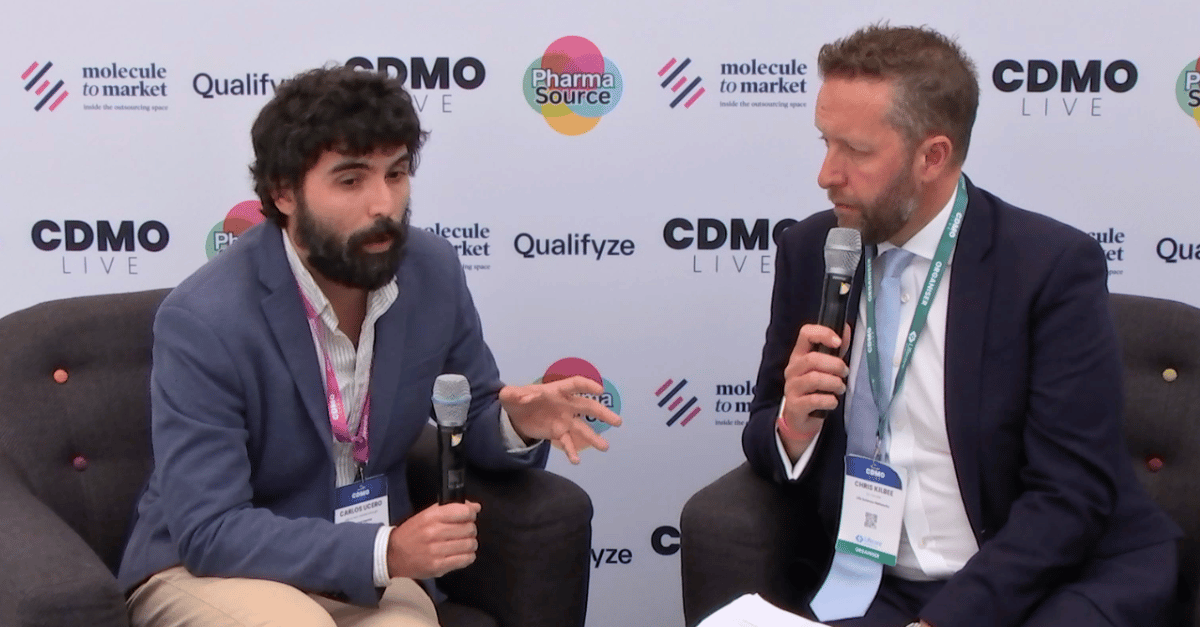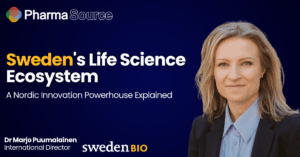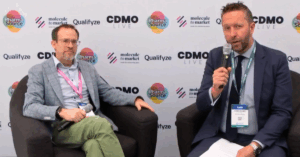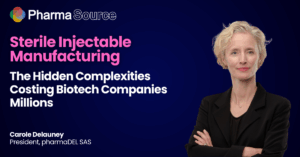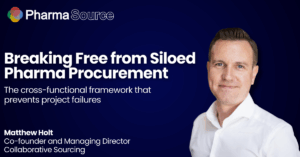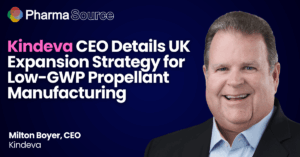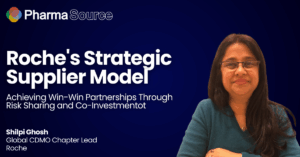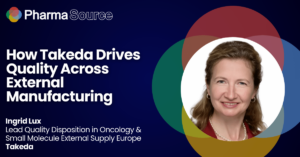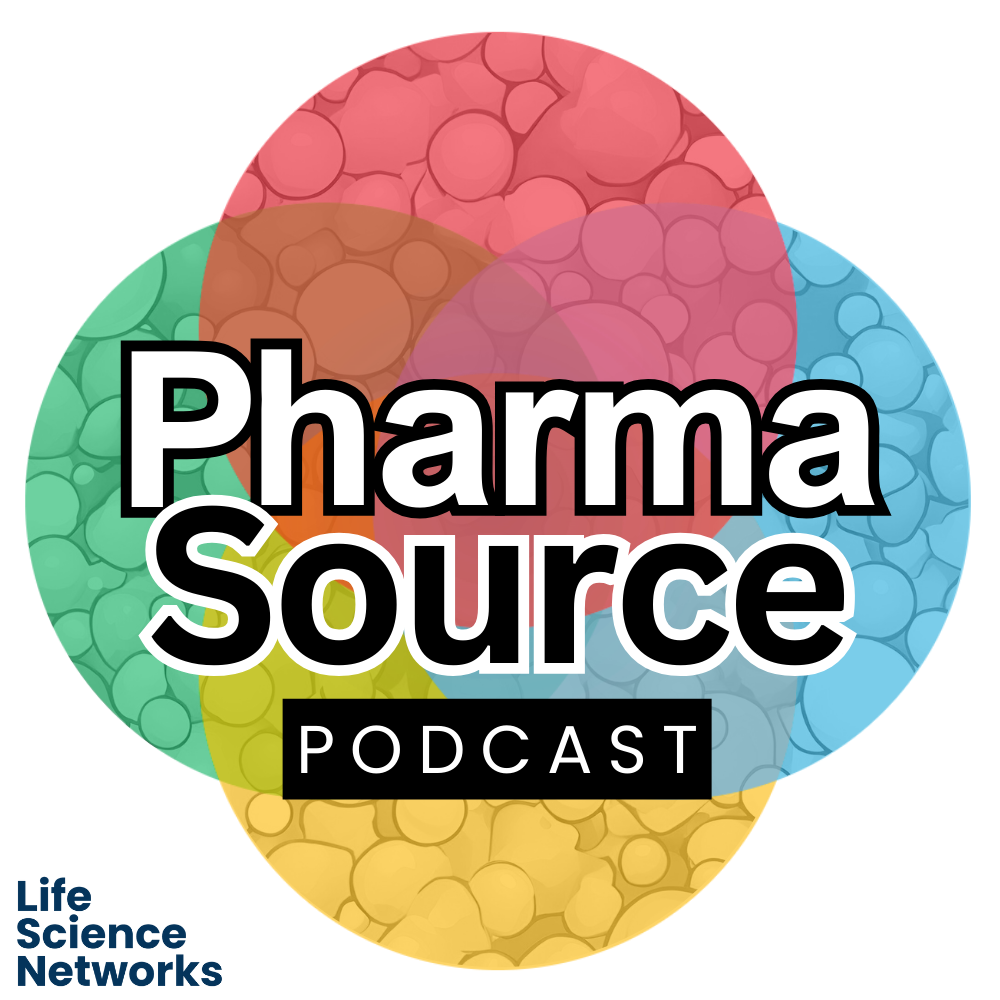“There is capability and there is space for new projects. The feeling is that there is capacity and there is real possibility for bringing products back to Europe.”
Carlos Ucero, CDMO & Tech Transfer Manager at Capital Farma, shares strategic insights on European manufacturing relocation at CDMO Live 2025.
Carlos manages CDMO scouting and tech transfer planning at Capital Farma, a three-year-old pharmaceutical company at the forefront of European manufacturing relocation. With over 16 years of healthcare industry experience, Carlos specialises in identifying and executing strategic API manufacturing relocations to strengthen European supply chains.
In this exclusive interview from CDMO Live 2025, Carlos reveals how Capital Farma’s European manufacturing relocation strategy addresses critical supply vulnerabilities whilst creating sustainable competitive advantages through strategic partnerships and focused execution.
Strategic API Relocation: Addressing Europe’s Manufacturing Vulnerabilities
Capital Farma’s European manufacturing relocation strategy specifically targets APIs where the continent faces supply chain risks through over-dependence on limited suppliers or foreign manufacturing.
“What we want is to relocate projects in Europe and manufacture APIs that have proven utility. We are focused on generics,” Carlos explains. “Europe needs a strategically well-positioned generics industry to ensure medicine availability when we need it.”
The company focuses on identifying generic medicines with established demand but vulnerable supply chains. “We can never forget that there are a lot of people that need access to medicines in a safe and economical way,” Carlos emphasises.
This approach directly addresses the supply chain risks that became apparent during recent global disruptions, where Europe’s dependence on external manufacturing created significant vulnerabilities for essential medicines. “This business is about people in the end, and healthcare is about people.”
Communication Excellence: The Foundation of Successful Relocation Projects
Carlos identifies open communication as the critical success factor in executing complex manufacturing relocations and managing CDMO partnerships effectively.
“From our side, we need open communication. It is something that is very important, along with strong commitment,” he states. “In every single project in this industry or research development, there will be problems for sure. It is impossible to have a clean and lean project.”
The complexity of European manufacturing relocation requires partners who can navigate challenges collaboratively. “The issue isn’t the problem itself, but how you react to the problem and how you manage it. For me, the key is communication – open communication,” Carlos explains.
He emphasises building trust through transparency: “This is a highly technical industry and I know I cannot have all the knowledge, so I trust in people. But I cannot trust people if communication isn’t clear.”
Timeline Realism: Avoiding the Costliest Relocation Mistakes
Carlos identifies a critical pitfall that can derail European manufacturing relocation projects: underestimating the complexity and timelines required for successful implementation.
“The mistake is undervaluing the effort required. You think it will be easier than it actually is—particularly with timelines—and this can compromise the entire project,” he warns.
Manufacturing relocation projects often suffer from overly optimistic planning that fails to account for regulatory requirements, tech transfer complexities, and validation timelines. “Make an estimation – in six months we can do that, two months we can do that – and it can compromise the whole project itself.”
Carlos advocates for realistic timeline planning that accounts for potential challenges: “For me, it’s better to build in breathing room. Timeline tightness is the worst mistake you can make.”
Technology Integration: Balancing Innovation with Proven Approaches
Whilst embracing technological advancement, Carlos maintains a pragmatic approach to implementing AI and digital manufacturing within European relocation projects.
“I’m not afraid of AI, but I think it’s very immature right now. It’s like trusting a child. Maybe you have your feeling, your thoughts, but we need to be careful with that,” he explains.
Capital Farma currently integrates AI strategically whilst maintaining human oversight: “We use AI in terms of research, market research, but we always compare with our own estimation. We are trying to include it because it saves time and time is money.”
Looking ahead, Carlos sees significant potential in emerging manufacturing technologies that could enhance European production capabilities: “There are some tools and flow chemistry and so on that I think will change the industry in a few years. It will happen for sure.”
Sustainability and Competitiveness: Balancing Environmental Goals with Market Reality
European manufacturing relocation must address sustainability requirements whilst maintaining competitive positioning against global alternatives.
“For us, it’s crucial. It’s critical. It’s highly important. But the thing is that I feel it needs to be well-sustained by authorities,” Carlos states. “It makes sense for us to create perfectly lean processes, but we need to remain competitive.”
The challenge lies in implementing environmental measures that support rather than hinder European manufacturing competitiveness. “I read a few days ago some guidelines from the European Commission concerning this balance or imbalance between one country and another in terms of environmental measures. It should be pushed also by the authorities because we need to gain competitivity.”
Future Manufacturing Focus: Advanced Therapies with Strong Traditional Support
Carlos predicts that European manufacturing relocation will increasingly focus on advanced therapies whilst maintaining robust capabilities in traditional pharmaceutical production.
“The future will be ADC payloads and these advanced technologies. But I think we’ll maintain strong support for established technologies that remain affordable. The trends will be nervous system and oncology,” he forecasts.
Despite the focus on cutting-edge treatments, Carlos believes established manufacturing technologies will remain essential: “I think that we will have very good support on genetic products for these kind of diseases or pathologies, and the future is focused therapies.”

